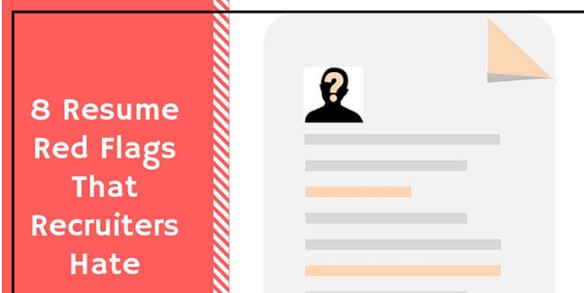I’ll never forget one of the first job interviews I had with a candidate. His name was Peter, and he was applying for a marketing position at the company I worked for. It was one of my first interviews, so I wanted to ensure that his credentials are valid and match the company’s needs.
He had written down a particular skill on his resume that caught my attention. It said that he had advanced knowledge of analytics and had completed two relevant coursework related to the subject.
At that moment, the team and I were almost 100% convinced that he’s the ideal candidate for the job. Just to make sure we’re not making a mistake, we asked an advanced statistics question. Soon, it became clear that he was not who he presented himself to be and certainly not qualified for the role we were trying to fill.
And this is only one example of a resume red flag. Every recruiter is different and has their own list of alerts that make them turn down a candidate.
I’ve put together a list of 8 resume red flags I believe will get you in the “no” pile for that job you’d love to land.
Let’s begin!
Don’t list your irrelevant hobbies
Although you might think that fun hobbies will set you apart from the other applicants, you’re wrong! Listing your love of chess or fishing can also work against you. Recruiters spend approximately 10-30 seconds scanning resumes and don’t want to waste their time reading how much you enjoy rock-climbing.
As much as it pains me to say, star-gazing is not something recruiters want to hear. The job they’re hiring for doesn’t involve star-gazing. The resume should be a formal document that tells the recruiter whether you’re a good match for the company. Your personal info and hobbies can be discussed during the interview.
However, if you happen to have a hobby that’s directly related to the job position you’re applying for, then certainly feel free to include it. For example, let’s say that you’re applying for a content writer at a company that makes surfing boards. In this case, mentioning your love for surfing is surely recommended.
Additional Reading: How to Make Your LinkedIn Profile Stand Out

Avoid adding unimpressive skills
When you list ” Great Microsoft Word skills” on your resume, recruiters read it like “Okay, so this person can type”.
It seems like every single person that’s putting together a resume must mention their Excel and PowerPoint skills. In fact, recruiters prefer not seeing these unimpressive skills on your CV. Unless you can run pivot tables or complex data modeling out of Excel, don’t say that you’re proficient.
The same applies to languages you speak or your college classes. You should only list a few important skills that are relevant to the open job position.

Don’t exaggerate
Unless you want to get turned down instantly! If you’re a junior JavaScript developer, there’s no need to say “Senior JavaScript Developer” in your resume. You might pass the first part of the recruitment process, but in the second one, the recruiter will like to double-check your coding skills.
What will you do when they give you an advanced coding exercise to complete? Even if you somehow pass the interview, the company will check your references and discover that none of them confirm the information on your resume.
Most importantly, if you get hired, you will have to prove your skills on the job. How will you prove that you are worthy of the job when you don’t possess the right skills?
Additional Reading: 7 Tips for Creating a 5-Star Video Resume
Don’t mention every single job you’ve ever had
There’s no need to list every single job you ever had. Recruiters are not interested in that intern job you had 10 years ago. They’ll expect you to have made career progress over the years and obtained more responsible job titles.
If you happen to have any job experience that’s not related to the job position you’re applying for, it’s best if you leave it out of the resume. For example, if there was a time when you were uncertain about your career in life and experimented with various industries, there’s no need to include those.
However, you can include past job experiences that are somewhat related to the open position you’re hoping to get. Let’s say that you’re applying for a job in sales. If you happen to have worked in a bake shop in your college days, explain how that job helped you develop great customer service skills.
Don’t include your high school information
Your high school shouldn’t be listed on your resume. Unless you’re still in high school or in your first couple of years of college. If high school education is the highest degree you currently hold, then feel free to add it to your resume. Once you obtain any form of higher education, get rid of your high school information.
To most recruiters, high school info looks like filler information. Three to five years after college, feel free to move your education info to the bottom of the CV. Your experience and work info should take the centerstage.
Additional Reading: Researching a Company Before a Job Interview


Avoid making typing errors
Correct grammar, spelling, and punctuation can make you stand out from the crowd. But failing to pay attention to these details is a resume red flag for many recruiters.
You should make sure that your verb tenses are written in the correct past or present tense. For example, when you’re writing about a job you held in the past, write in the past tense. But if you’re giving information about a current job, then make sure you use the present tense.
Here’s how your job positions should look on your resume
- Current position: “Train and mentor employees.”
- Past position: “Trained and mentored employees.”
What’s more, resumes aren’t the place to be using pronouns like “I” or “my”. However, when conjugating your verbs, make sure to write in first-person and not in the third.
For example:
- Right: “Train and mentor employees.”
- Wrong: “Trains and mentors employees.”
Don’t over-inflate your job titles
Those inflated titles that job seekers love using are not playing well with recruiters. They’re another resume red flag that you should avoid. Some recruiters call these titles “weird” and “cryptic”, while others call them “annoying” and “irrelevant”.
The truth is that non-obvious job titles can only confuse recruiters and the applicant tracking software. You might even get thrown out of the system just for including a cryptic job title. Present yourself in a manner your recruiters are looking forward to seeing.
Don’t leave gaps without an explanation
Gaps in employment are major resume red flags to recruiters. However, they don’t have to be so alarming if you explain them properly.
Let’s say that you took eight months off of work. You want to explain that big gap in your resume, preferably in italics or parenthesis. Write “traveled abroad” or “took time off to spend with family” so that your recruiters don’t assume the worst. Be honest about your employment gap as this will make you more trustworthy. Offer them a reasonable explanation and you won’t land on the “no” list.
Final Word
These are the eight resume red flags that can alert recruiters about a candidate’s weaknesses. By being attentive not to make these mistakes, you’ll manage to show the recruiters that you’re the right candidate for the job and not just a random person who desperately needs a job.
Now go and dazzle them!









